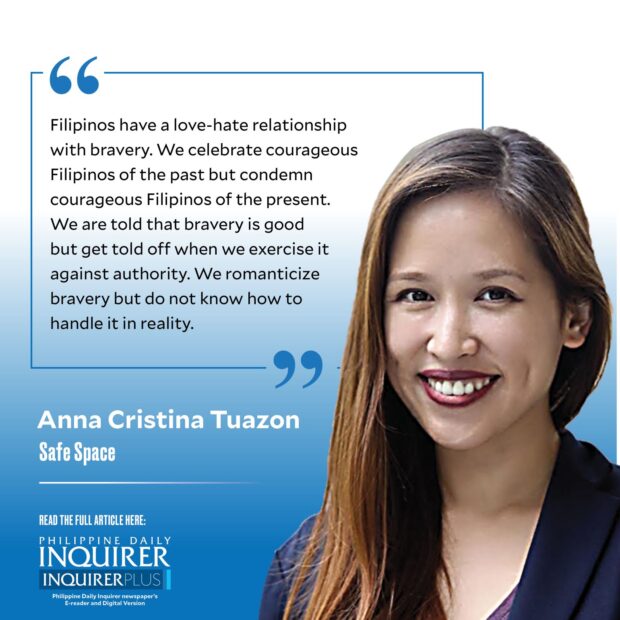What it means to be brave

President Marcos, in his speech commemorating Araw ng Kagitingan, reminded Filipinos that “Like what our forefathers displayed, we cannot allow [ourselves] to be subdued or be persecuted, especially within the confines of our own domain.” Amidst the looming aggression of China in the West Philippine Sea, Speaker Martin Romualdez also called on Filipinos to “reflect on the courage and bravery of our forebears who defended our freedom during the darkest chapters of our history.”
What does it mean to be brave nowadays?
Does it require physically defending our country as expressed by the mandatory Reserve Officers’ Training Corps proposal that Sen. Ronald dela Rosa keeps pushing for? Is it bravery to don on a “West Philippine Sea” shirt at a basketball game (interestingly enough, by the same senator)? Is it offering fiery rhetoric such as when former president Rodrigo Duterte, during an election campaign, promised to ride a jet ski to contested islands to pin the Philippine flag (while at the same time quietly promising China a status quo deal despite us winning the arbitration ruling)?
Article continues after this advertisementFilipinos have a love-hate relationship with bravery. We celebrate courageous Filipinos of the past but condemn courageous Filipinos of the present. We are told that bravery is good but get told off when we exercise it against authority. We romanticize bravery but do not know how to handle it in reality.
These are trying times and courage is needed more than ever. The growing tension with China should force us to reflect on what kind of bravery is needed. The prospect of war and conflict should never be taken lightly. It takes courage to face such a possibility. It also takes courage to show restraint at such a pivotal junction in our history. So which is it?
Courage doesn’t necessarily dictate how we should do things. A lot of people confuse the willingness to take up arms—or in a smaller way, physical aggression—as bravery. The courageous path isn’t always violence. Sometimes it takes more courage to choose resolution over escalation. I have a friend who likes to tell stories of him confronting errant drivers, with these usually ending in him offering a fistfight. He tells it in a way that makes me think he wants us to be impressed that he wasn’t afraid to fight.
Article continues after this advertisementThere is an oft-cited quote: “courage is not the absence of fear,” with many versions from the likes of Franklin D. Roosevelt, Nelson Mandela, and Mark Twain. Indeed, there is no bravery without fear. Bravery without fear is not bravery but recklessness. Bravery is not bravado. So let us not confuse reckless rhetoric with courage. How many times have citizens been successfully wooed by political candidates using reckless rhetoric? Only to find that their actions—whether in committee hearings or behind closed doors—are anything but brave or patriotic.
Courage is doing what needs to be done even if the path ahead is not easy. Many things in our day-to-day life require courage. School and work life, with all their challenges, definitely require courage. Most goals worth pursuing require courage. Even pursuing a simple life requires courage—the courage to face others’ (i.e., parents) disappointment when you don’t meet their lofty or ambitious expectations as well as the courage to not compare your life against others.
In the larger issue of protecting our sovereignty, what is courage? It is, perhaps, the willingness to face more powerful nations actively and not backing down simply because of fear. It could also be continuing to follow the international rule of law despite pressures to engage outside of it. Courage could be in the form of persevering in the long and difficult work of diplomacy despite accusations of cowardice because you know this path will prevent the unnecessary deaths caused by war.
How can ordinary citizens show their courage and bravery? We should be brave enough to show our leaders how we think and feel about the matter. Some belittle such expressions as simply being “keyboard warriors.” Others even condemn protests, the ultimate form of democratic expression, as unpatriotic. But when harnessed effectively, making full use of our democratic right to expressing our political opinions and beliefs can force our leaders to think thoughtfully and to make careful considerations before making any political action or inaction that affect us. We must have the courage to express ourselves. And we must have the courage to do so responsibly. Otherwise, we revert to recklessness instead of courage.
As we admire the bravery of our past heroes, we must recognize and support bravery in its present form. Let us commit to the path worth taking and face our fears.
—————-
aatuazon@up.edu.ph
















